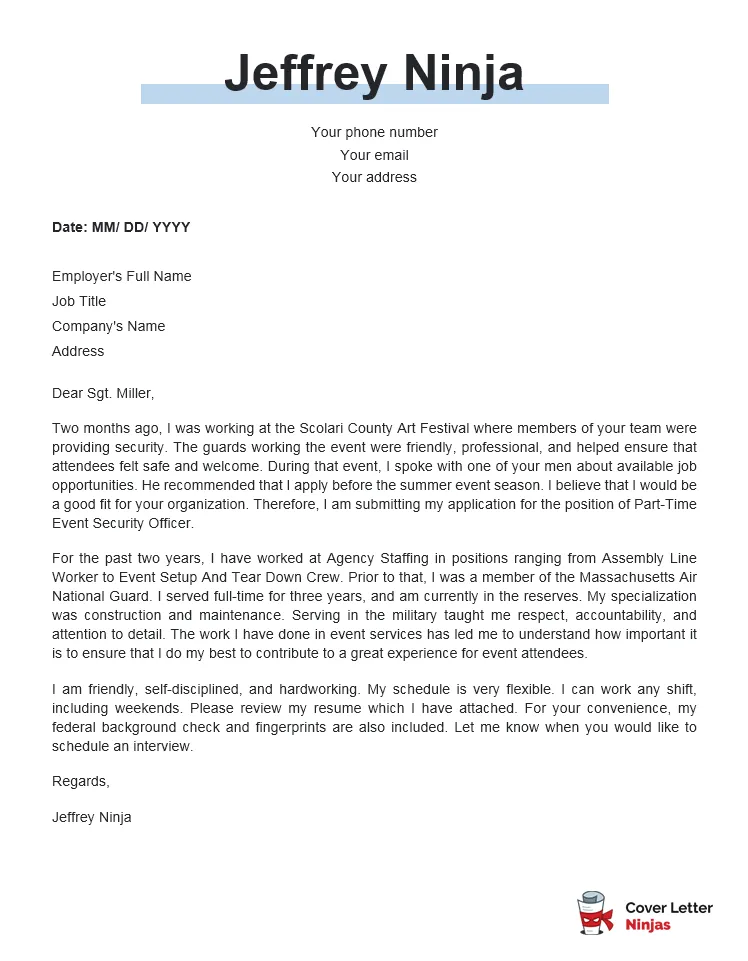Why a Strong Security Cover Letter Matters
In the competitive field of security, a well-crafted cover letter can be your most powerful tool. It serves as your first introduction to a potential employer, providing an opportunity to showcase your qualifications, experience, and personality. A compelling security cover letter example grabs the hiring manager’s attention, setting you apart from other applicants. Think of it as your personal sales pitch, emphasizing why you are the ideal candidate for the specific role. A strong letter conveys professionalism, attention to detail, and a genuine interest in the position. It’s a chance to tell your story and demonstrate how your skills align with the company’s needs. Ignoring the importance of a cover letter could mean losing the job to an applicant that highlights their key attributes.
Highlighting Relevant Skills and Experience
Your security cover letter is the perfect place to highlight the skills and experience that make you a strong candidate. This is where you translate your resume into a narrative that demonstrates your suitability for the role. Focus on the abilities that align with the job description, such as surveillance, access control, conflict resolution, and emergency response. Provide specific examples of how you’ve utilized these skills in previous roles, quantifying your achievements whenever possible. This will paint a clear picture for the hiring manager of what you can bring to the table. Be sure to emphasize any certifications, training, or specialized knowledge relevant to the security field, such as first aid, self-defense, or specific security software or systems. The more relevant information you add to your cover letter example, the higher your chances are to get the job.
Key Skills to Showcase
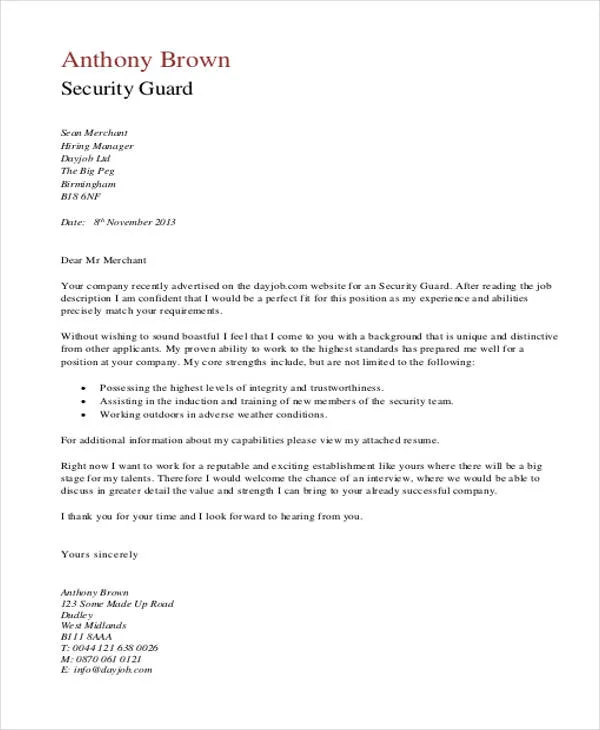
When writing your security cover letter, emphasize the skills that are crucial for success in the industry. This includes communication skills, as security professionals often interact with various individuals, from colleagues to the public. Demonstrate your ability to remain calm under pressure and handle stressful situations with professionalism and diplomacy. Detail your proficiency in surveillance techniques, including CCTV monitoring, patrol duties, and incident reporting. Highlight your problem-solving abilities and experience in making quick, sound decisions in emergency situations. List any technical skills, such as knowledge of security systems, access control, and alarm systems, and make sure you include interpersonal skills, such as active listening, empathy, and the ability to build trust. Including such information increases the impact of your security cover letter example.
Experience in Security Roles
Clearly describe your previous security roles in your cover letter. Provide details about your responsibilities, accomplishments, and the environments in which you have worked. If you have experience in access control, explain the systems you have managed and your role in preventing unauthorized access. If you’ve been involved in surveillance, mention the types of surveillance equipment you’re proficient in and any successful incident detections. For any experience in emergency response, describe your involvement in responding to incidents, including your role in coordinating with emergency services and ensuring the safety of personnel. If you have experience in patrol duties, detail the types of patrol methods you have used, such as foot patrols, vehicle patrols, or remote surveillance. Highlighting these specifics in your security cover letter example, will help you stand out.
Tailoring Your Cover Letter
One of the most crucial aspects of a successful security cover letter is tailoring it to the specific job and company. Generic letters often fail to impress hiring managers, who are looking for candidates who have genuinely researched the role and the organization. Show that you understand the company’s mission, values, and the specific requirements of the position. Use keywords from the job description throughout your letter, but ensure it flows naturally. Demonstrate how your skills and experience align with the company’s needs and the job’s demands. Tailoring your letter shows that you are seriously interested in the position and have taken the time to understand what the employer is looking for. This demonstrates that you can contribute, and is a much more powerful tool compared to sending out generic letters. This shows you are a strong applicant and shows commitment.
Researching the Company and Role
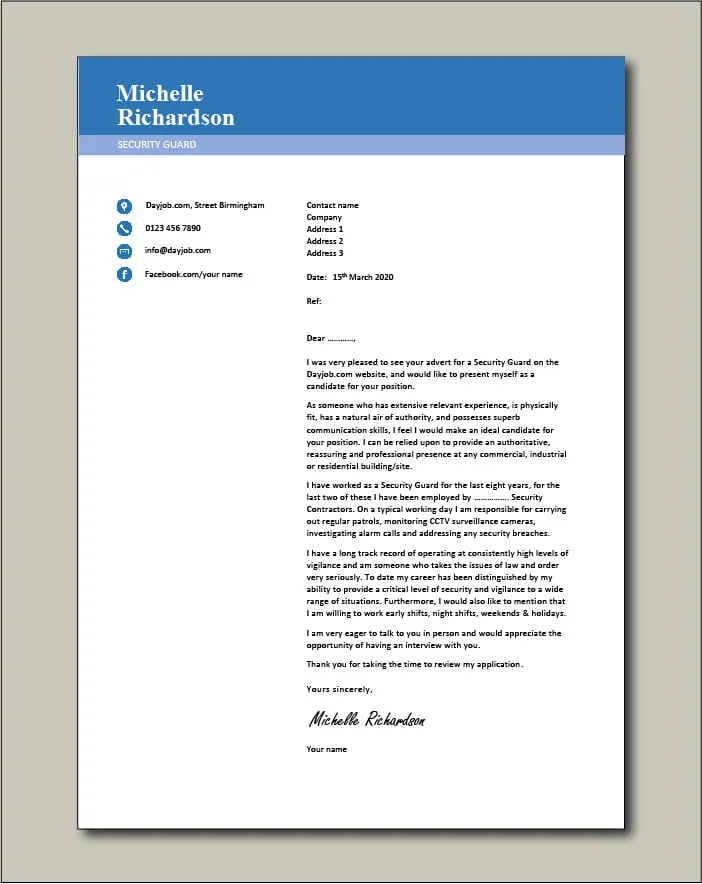
Before you start writing your security cover letter, invest time in researching the company and the specific role. Visit the company’s website, read their mission statement, and look for information about their values and culture. Learn about their security protocols, any recent security incidents, and their overall security strategy. Understand the specific responsibilities of the role by carefully reading the job description. Identify the key skills and qualifications that the employer is seeking. Use online resources, such as LinkedIn, to find out more about the company’s employees and their security team. Knowing these details will provide you with insights into the company’s needs and help you tailor your letter effectively. This also gives you an upper hand to make sure you know what you are talking about.
Customizing Your Letter
Once you have researched the company and role, it’s time to customize your cover letter. Address the hiring manager by name, if possible, to show that you have taken the time to research the company. In the opening paragraph, state the specific position you are applying for and why you are interested in the company. In the body of the letter, highlight the skills and experiences that are most relevant to the job description. Use specific examples to demonstrate how you have successfully handled similar responsibilities in the past. Mention any relevant certifications or training. Show how your skills and experiences align with the company’s needs, demonstrating you understand the requirements of the role. Tailor your letter to show that you understand the company’s values and culture. Make sure that the letter is tailored and reflects your interest in the role.
Formatting Your Security Cover Letter
The formatting of your security cover letter is a key aspect of making a positive first impression. A well-formatted letter is easy to read and demonstrates your attention to detail and professionalism. Choose a clear, readable font such as Times New Roman, Arial, or Calibri, and keep the font size between 10 and 12 points. Use single spacing within paragraphs and double spacing between paragraphs to make the text easy to follow. Include standard margins of 1 inch on all sides of the page. Ensure that your letter is free of grammatical errors and typos, and use a professional tone throughout. Use bullet points, bold text, and headings to highlight key information and make your letter more scannable. Keep your letter concise and to the point, ideally within one page. Such formatting and details showcase professionalism.
Contact Information
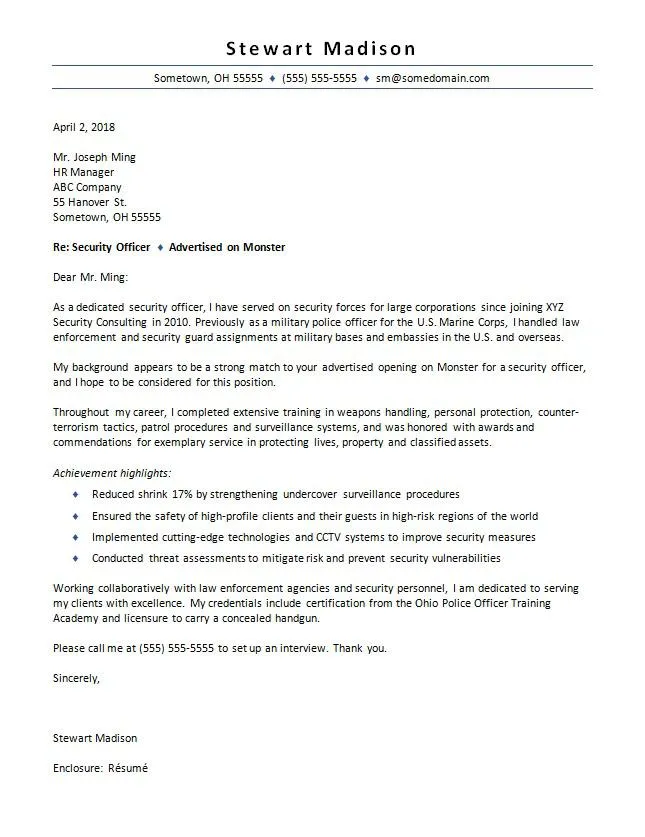
Your contact information is a must for any security cover letter example. Place your name, phone number, email address, and professional LinkedIn profile URL at the top of the letter. If you have a physical address, you can also include it. Make sure your email address sounds professional, and your phone number is accessible. Ensure that your voicemail is set up to answer professionally, and that your LinkedIn profile is up-to-date and reflects your qualifications. This ensures that the hiring manager can reach you easily. Accuracy is crucial to make sure that they can contact you. Don’t include unnecessary information. Make sure the information is updated.
Professional Salutation
The salutation is the first interaction a hiring manager will have with your letter. Always start with a formal salutation, such as “Dear Mr./Ms./Mx. [Last Name]” if you know the hiring manager’s name. If you are unable to determine the name, a safe option is “Dear Hiring Manager” or “Dear [Company Name] Hiring Team.” Avoid informal salutations like “To Whom It May Concern” or using the first name of the hiring manager unless you have a pre-existing professional relationship. Ensure that you spell the name correctly and that the title is accurate. The salutation sets the tone for the rest of your letter, so make sure it reflects professionalism and respect. It shows your attention to detail and commitment to the role. This shows that you are serious.
The Body of Your Cover Letter
The body of your security cover letter is the main content of the letter, where you persuade the hiring manager to consider your application. This is where you should provide the information about your skills, experience, and why you are the best fit for the role. Structure your body in three to four paragraphs: the opening, middle paragraphs, and closing. Each paragraph should serve a specific purpose, working together to create a cohesive and compelling narrative. Use clear and concise language, and avoid jargon or overly technical terms that the hiring manager might not understand. Ensure that the content is easy to follow. Make it simple, highlight your experiences in a way that will be easily understood, so that the hiring manager gets a quick understanding of why you are the best choice for the job.
Opening Paragraph
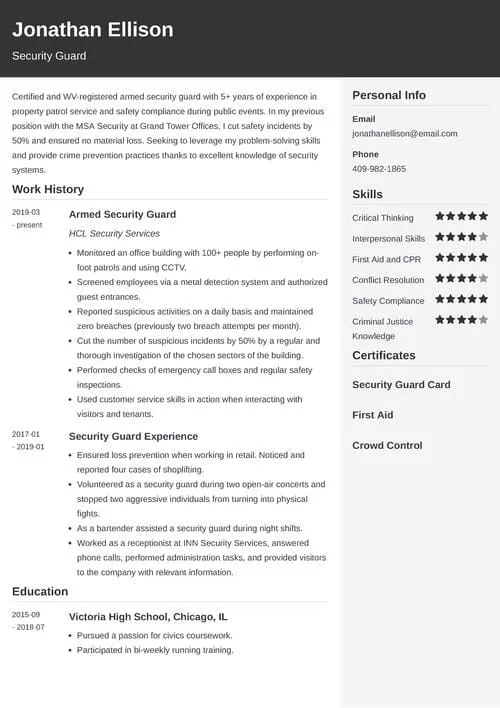
The opening paragraph of your security cover letter is your first opportunity to grab the hiring manager’s attention. Start by stating the specific position you are applying for and how you learned about the opportunity. Briefly mention something that sparks your interest in the company or the role, showing that you have done your research. Clearly state your purpose for writing the letter and express your enthusiasm for the position. Keep it concise and focused, aiming to highlight your key qualifications in a way that captures the reader’s interest. Your goal is to create a positive first impression and encourage the hiring manager to keep reading. This should convince the recruiter to read further. Don’t be too detailed, but provide enough information to get them interested.
Middle Paragraphs
The middle paragraphs of your cover letter are where you provide the details about your qualifications, skills, and experiences. Tailor these paragraphs to the job description and highlight the skills that the employer is seeking. Provide specific examples of how you’ve demonstrated these skills in previous roles. Use the STAR method (Situation, Task, Action, Result) to provide context and illustrate your accomplishments. Quantify your achievements whenever possible, such as the number of incidents you have handled or the amount of money you have saved through your actions. Show, don’t just tell; and support your claims with evidence. Use action verbs, and avoid vague statements. This will show what you did in previous roles. These paragraphs are the core of your cover letter.
Closing Paragraph
The closing paragraph should reiterate your interest in the position and express your eagerness for an interview. Thank the hiring manager for their time and consideration. Reiterate your qualifications and why you are a strong fit for the role. Include a call to action, such as requesting an interview and providing your contact information. Avoid sounding presumptuous or demanding, but be confident in your ability to contribute. Proofread the entire letter one last time before you submit it. This concludes the letter and leaves a lasting impression on the reader, showing that you are an ideal candidate. Concluding with a call for action is crucial to make sure you get an interview.
Proofreading and Editing Your Letter
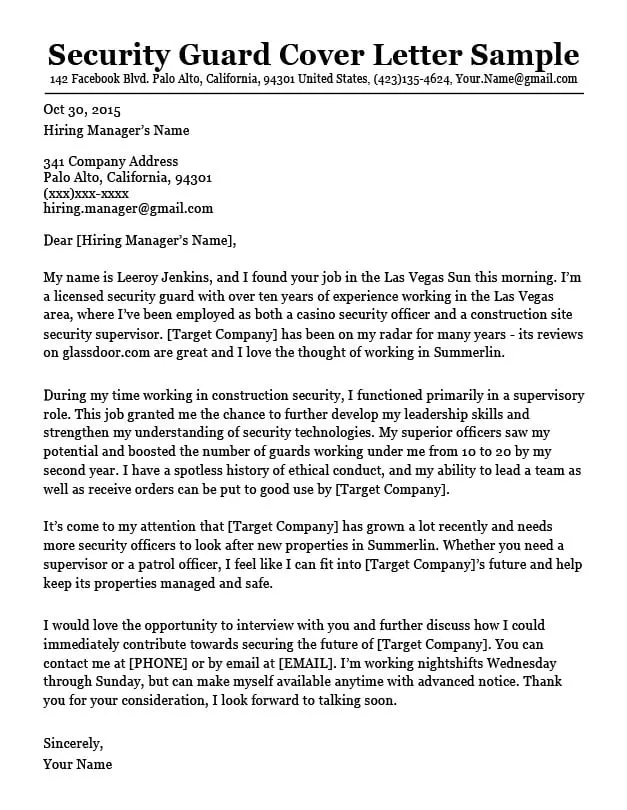
Before submitting your security cover letter, proofread and edit it meticulously. Errors in grammar, spelling, or punctuation can be the difference between getting hired and being rejected. Check for any inconsistencies in your information, and ensure that the formatting is correct. Use a grammar and spell-checking tool to catch any errors you may have missed. Read your letter aloud to identify awkward phrasing or unclear sentences. Consider having a trusted friend or colleague review your cover letter. A fresh pair of eyes can often catch mistakes that you might overlook. The goal is to ensure that your letter is polished and professional. This will show attention to detail and commitment.
What to Avoid in Your Cover Letter
There are several things you should avoid in your security cover letter. These mistakes can immediately disqualify your application. Always avoid generic content and focus on tailoring your letter to each specific role and company. Never use negative language or make disparaging remarks about previous employers or colleagues. Avoid using jargon or overly technical terms that the hiring manager might not understand. Don’t include irrelevant information, such as hobbies or personal opinions. Refrain from exaggerating your skills or experience, or making false claims. These actions are misleading and can lead to your application being rejected. Focusing on what to avoid can increase your chances of getting hired. These actions can significantly affect your chances of success.
Common Mistakes
There are several common mistakes to avoid in your security cover letter. The most frequent mistake is not tailoring the letter to the specific job and company. Generic letters send the message that you haven’t put in the time to research the role. Failing to highlight relevant skills and experiences is also a common error. If you don’t clearly demonstrate how your qualifications align with the job requirements, the hiring manager may not see you as a good fit. Another mistake is including typos, grammatical errors, or formatting errors, which can damage your credibility. Writing too much or not enough can also be a problem. Your letter should be concise and to the point, ideally one page, but it should still include essential information. Paying attention to such details can improve your chances of getting the job.
Negative Tone and Unprofessional Language
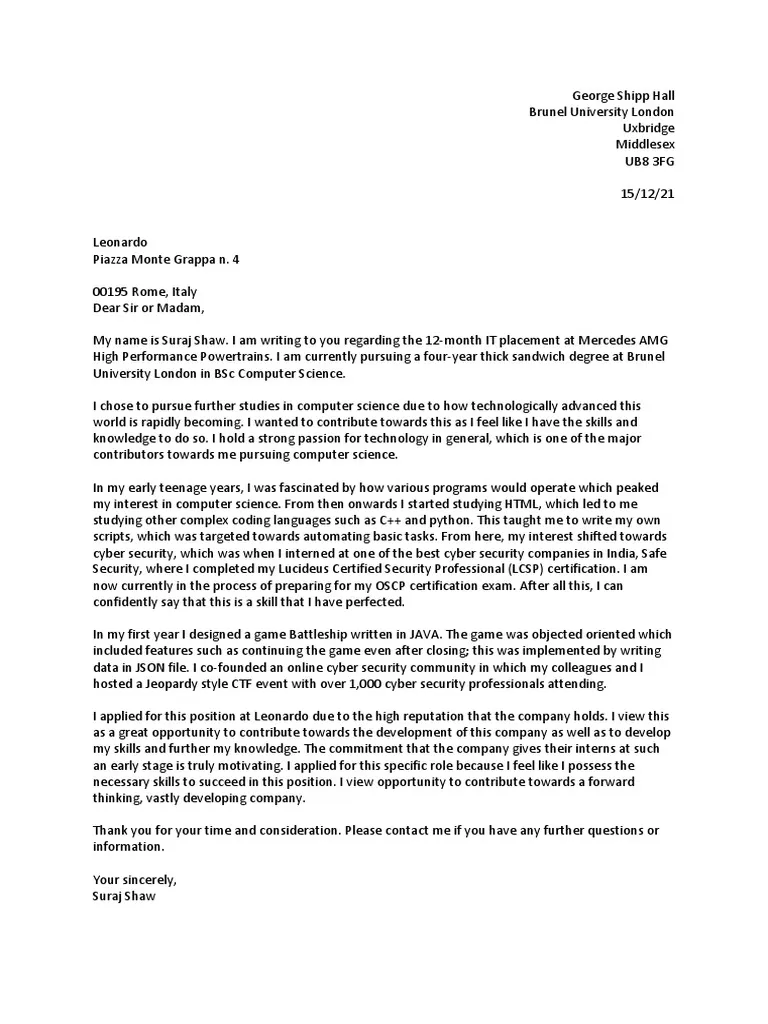
Avoid using a negative tone or unprofessional language in your security cover letter. This can immediately damage your chances of getting hired. Never use negative language, such as complaining about previous employers or colleagues. Avoid expressing your opinions about political or social issues, unless they are relevant to the job requirements. Refrain from using slang, informal language, or contractions. Maintain a professional and respectful tone throughout your letter. Focus on your positive attributes and experiences, and express your enthusiasm for the opportunity. Such mistakes will make your letter look unprofessional. Use professional language and tone when you are applying for a security role, and avoid making unnecessary negative comments.
Generic Content
Avoid including generic content in your security cover letter. Generic letters often fail to impress hiring managers. Use specific examples of your skills and experiences, and tailor your letter to each job description. Don’t reuse the same cover letter for every application; instead, personalize each letter to the company and role. Highlight relevant skills and experiences, and quantify your accomplishments whenever possible. Research the company and the role, and demonstrate your understanding of the organization’s needs and values. Focusing on specificity and tailoring your cover letter will demonstrate your commitment and professionalism. Generic letters show a lack of interest in the role. Your cover letter example should stand out.
Actionable Steps to Apply
To get started with your job application, start by carefully reviewing the job description. Make a list of the required skills and qualifications and identify the areas where your skills and experience align. Tailor your security cover letter to the specific requirements of the role. Customize your resume to reflect the job description. Research the company and the role and use this information to personalize your letter. Proofread your cover letter and resume meticulously. Submit your application through the appropriate channels, following all instructions. Don’t wait too long to apply, as the hiring managers usually review applications in the order they are received. Following such steps will help you stand out from the other candidates.
Submitting Your Application
When submitting your security cover letter and resume, make sure to follow all instructions provided by the employer. Submit your application through the designated online portal, or as requested in the job description. Save your documents in a professional format, such as PDF, to ensure that the formatting is preserved. If the job description requests a specific file name, use that format. Double-check that all your contact information is accurate, and ensure that you are using a professional email address. Include a subject line that is clear and concise, such as “Security Officer Application - [Your Name]” if sending your application via email. Be sure that the documents and format match what is asked for. Following these steps increases your chances of getting an interview.
Following Up
After submitting your application, it’s appropriate to follow up with the hiring manager or the HR department. However, don’t follow up immediately after submitting your application. Wait for a reasonable period, as the employer may take a week or two to review all the applications. Send a brief and polite email to the hiring manager or the HR department, expressing your continued interest in the position. Reiterate your qualifications and thank them for their time and consideration. Avoid sending multiple follow-up emails or calling excessively, as this could be seen as intrusive. A well-timed and polite follow-up can show your continued interest in the role. This shows your interest and commitment. Follow up to show how much you are interested.
